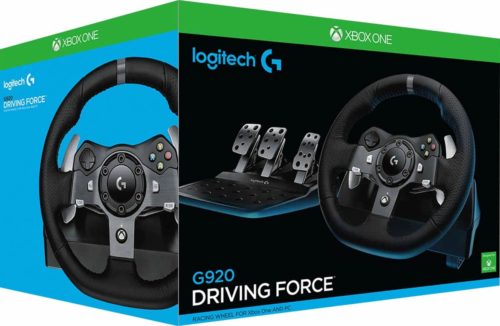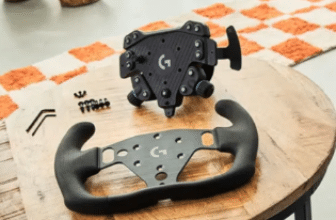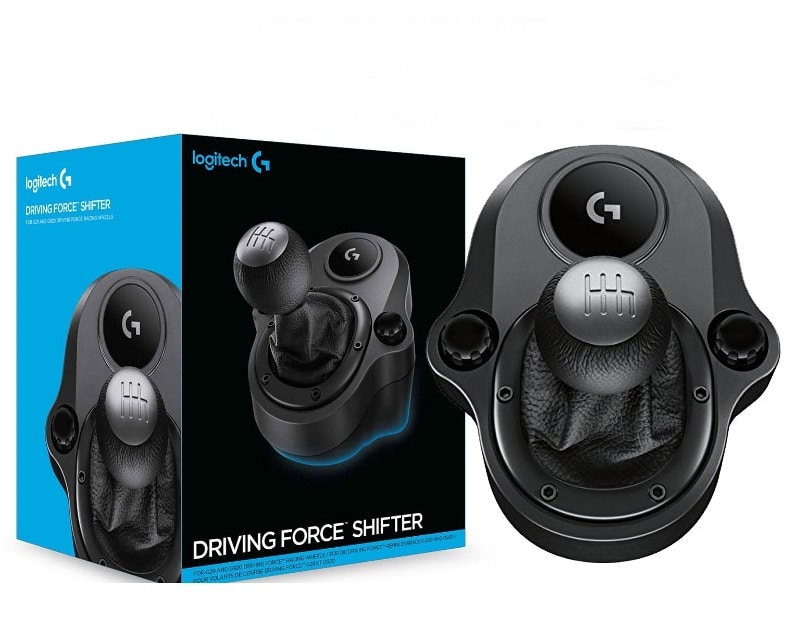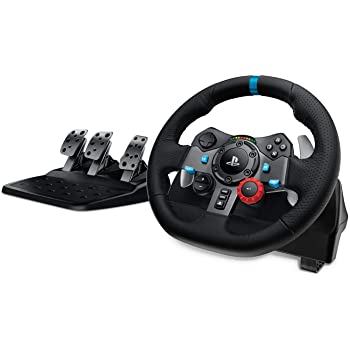The Logitech G920 and its cousin the G29 are two of the most successful simracing steering wheels on the market. The differences between the two models? A few aesthetic details and console compatibility. The G920 is PC and X Box compatible, while the G29 is PC and PS4 compatible.
This steering wheel falls into the mid-range category, but as you’re about to discover, it’s not necessarily in this category that it’s most at home. Far from it! So is this Logitech steering wheel still worth the price? Let’s find out!
The Logitech G920 from a technical point of view
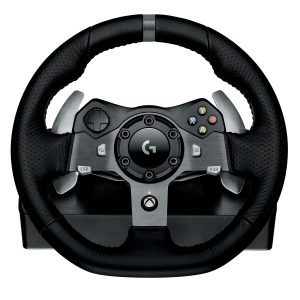
- Compatibility: PC, X Box
- Force feedback: Yes
- Wheel diameter: 28cm
- Pedals: 3
- Customizable buttons: 13 keys
- Gear change: Movable paddles, ( Logitech Driving Force Shifter optional)
- Turning range: 900
- Motor: Two gear motors
- Connections: 1 outgoing USB to console, 1 incoming power supply, 1 pedalboard connection to base, 1 manual box connection to base
- Weight: 5.2 kg
Design and ergonomics
We unpack the beast and the first thing that comes to mind is “Ah well, it’s the same”. We find the same architecture as the G29, itself almost identical to the G27.
At first glance, you can tell it’s a mid-range model. It’s not ugly, far from it, and the leather (real and hand-laid, it seems) is quite pleasant to the touch. I like the fact that the metal paddles are well finished and don’t attack the fingers when you operate them.
The bundle is very light. It weighs in at just over 5Kg in total, of which only 2.2Kg is for the steering wheel base . If you don’t have a fixed cockpit, this light weight is good news: you won’t be so lazy to get the G920 out of the cupboard!
In terms of motorization, we’re sticking with two good old-fashioned gear motors. It’s basic, but it’ll stand the test of time without the need for a mousetrap. It’s interesting to note that, despite the years and competitors switching to belts, Logitech continued to launch geared motors.
The pedalset
As far as the pedals are concerned, Logitech’s standard 3-pedal pedals are to be found. The advantage is that you’ve got a clutch pedal ready for use if you want to treat yourself to a gearbox. More on this below.
Design-wise, we’re back to the standard plastic look. This is light years ahead of what Thrustmaster offers with the T3PA Pro. That said, its metal plates are visually very appealing.
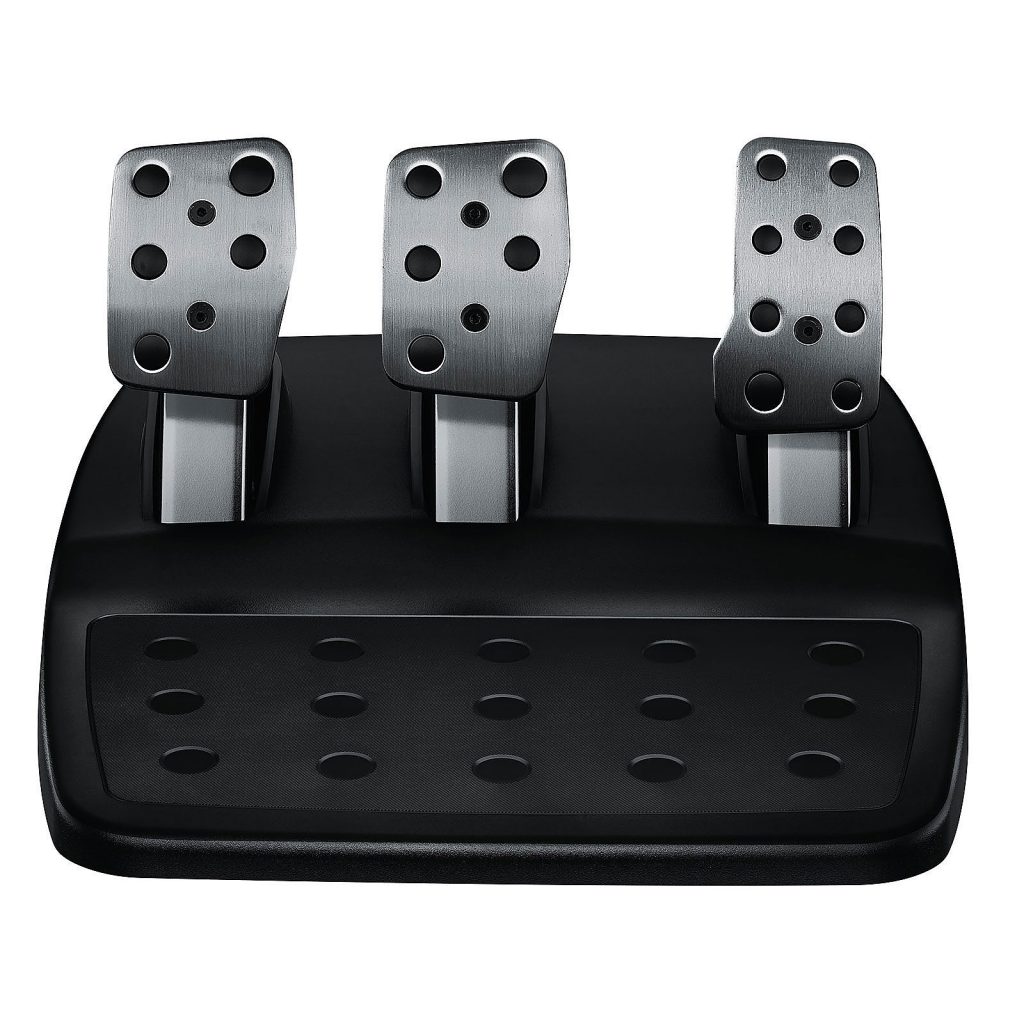
The G920 is designed for occasional players, so it’s hardly surprising that the pedals aren’t adjustable. Except for their spacing.
To “nail it to the floor”, there’s a grip bar (very effective on carpet). The traditional rubber pads and M6 screw threads for attaching the pedalset to a cockpit.
Beware, however, that it’s difficult to secure the pedalset to a wall because of its connecting cable.
What I don’t like about this pedalboard
Logitech has tried to innovate with this pedalset by simulating a Load Cell brake pedal.
For those wondering: standard simracing brake pedals use potentiometers to calculate what you’re doing with your feet. It’s the position of the pedal that gives your console the force you apply to the brakes. Of course, this has nothing to do with a real car, where it’s the pressure you exert on the pedal that determines the braking force. The Load Cell is a pressure sensor that replaces the potentiometer on the brake pedal, so you can get your finger (or foot) on the pulse of perfection in your simulation.
To simulate the Load Cell sensor, Logitech has tried an innovative trick.
Apply a rubber that hardens the last centimetre of the brake pedal stroke. Then discreetly modify the braking curve so that it is not linear but exponential over the last centimetre. In other words, the steering wheel software grants more braking percentages to this famous last centimetre.
The result? Light years away from the sensations of a Load Cell brake, but it’s a good idea! The problem is that it’s less intuitive than a load cell and harder to get the rider’s brain to accept than a simple potentiometer brake.
Installing the Logitech G920
To install the G920, we use the good old plastic hooks, which can be used without tools. Table mounting is perfect. If you have a cockpit, you’ll find two M6 screw threads under the base of the steering wheel. And if you have a cockpit with a tilt bracket for the pedalboard, you’ll be delighted to find that you can also secure the pedalboard with M6 screws.
Connections
As far as connections are concerned, under the base of the steering wheel you’ll find :
- USB out to your X Box or PC
- Power cord
- Pedalboard connection
- Connection for Logitech Driving Force Shifter H-box (not supplied with steering wheel)
And for those of you who are always too short on cables, Logitech has been more than generous with the lengths of the USB, pedalboard connection and power supply.
Comfort and feel
As soon as I start riding, I go through the power feedback adjustment menu. An essential step if you really want to enjoy the ride.
Already familiar with the G29, I wasn’t surprised by the G920’s force feedback. It’s precise enough to understand what your vehicle is doing. Its two geared motors give a “rawer”, more direct feel than a belt-driven flywheel. This is old technology, and you can feel it. But that doesn’t mean the G920 isn’t worth the detour!
You’ll know what your car is doing, recognize the limits of grip, feel vibrators and bumps. It’s a steering wheel that does its job! The point that worries me most is the famous brake pedal. I know that Logitech wanted to innovate by offering an ersatz Load Cell at a low price, but having been used to Load Cells for a while now, I’m having a really hard time getting used to it.
Obviously, I’m trying to put myself in your shoes as a user. This steering wheel will probably be the only one you’ll have for a few years, and the few hours it takes to get used to this brake pedal will soon be forgotten.
The Logitech G920 with a Shifter
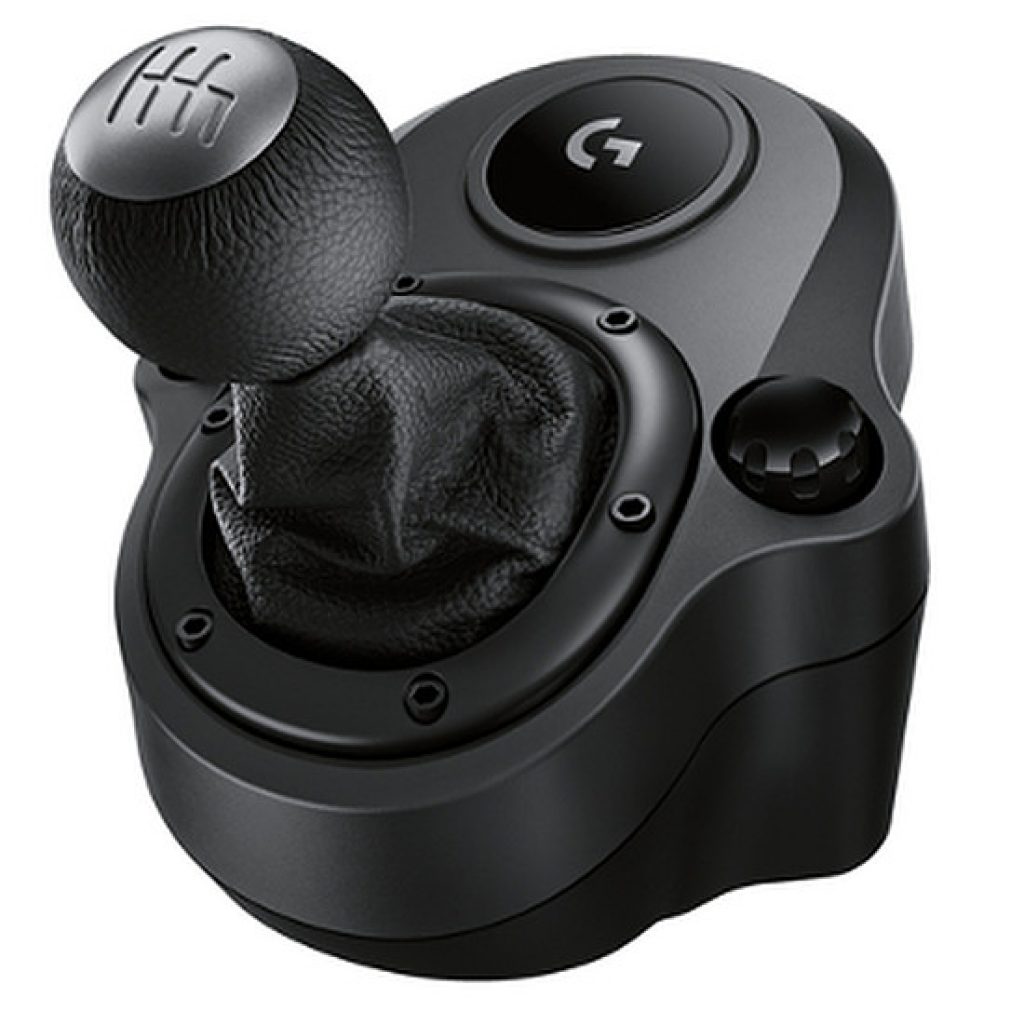
To get the most out of your pedals, you’ll need the Logitech Driving Force Shifter.
A 6-speed gearbox plus reverse that attaches to your table in the same way as the steering wheel base.
In terms of customization, Logitech’s choice is limited. The ecosystem is literally limited to the gearbox. Period.
No steering wheel, no handbrake. In any case, Logitech’s target audience is not one for excessive customization.

